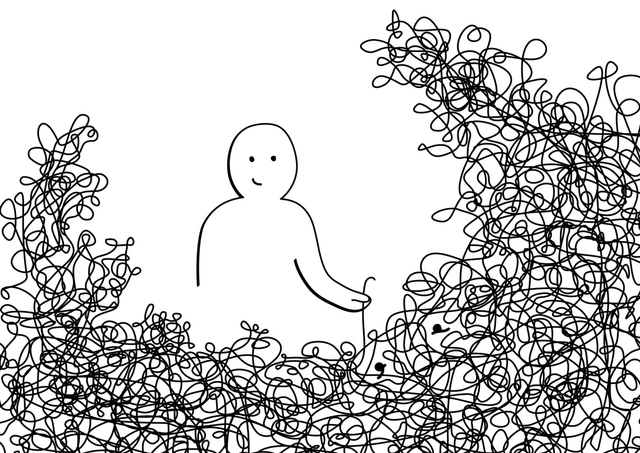Learning how to learn
Learning is a metaskill which we all desperately need to survive in our rapidly changing world. Doesn’t matter what are you learning to play drums, writing poetry or computer science. It does all require industries cognitive effort. For learning process it’s very common to get lost, feel depressed or even decided to give up. Also we live in a distracting environment which is not helping us to focus on complex concepts.

Good news everyone! Learning it is a skill and like any other skill we can train it and become a master of our learning process. We just need to do it right!
Focus and planning
Deep focus work is a key element of successful learning. But before we dive into deep, we need to make a plan of what we want to achieve within a unit of time. It’s very important to write your local goals down (or type it down) so we can track our progress.

I would like to use pomodoro technique to organize my personal workflow. Here is how the this technique loop works:
- Set up a timer for 25 minutes
- Focus work, not interruption
- Reward!
- Repeat
After each iteration stop and make a check mark on piece of paper (or any other devices). If you have fewer than 4 check marks, take a short break (3–5 minutes) and get back to work. After four pomodoro, take a longer break (15–30 minutes), reset check mark count to zero and go back to work.
During brakes don’t forget to reward yourself somehow. It could be a candy (don’t do that too much) or inner appreciation of your hard work.
Chunking. When we face new subject it could feel huge and impossible to handle. And the way to deal with that complexity is chunking.

Chunk is a generalized piece of material. First we overview subject and divide it into chunks. After we can jump deeper into each junk without losing context. Each chunk is not that big and intimidating as whole subject so we can handle it. After going through enough chunks picture of subject as a whole should come up together.
Spaced repetition. But don’t be naive, our mind will try to trick us every time it could in order to avoid hard cognitive effort. After reading or listening to a lecture it easy to feel illusion of competence. Even after rereading and re-listening there is no guarantee that you understand material enough. If we want not to be tricked by an illusion of competence we should try to recall material. Best way to do it is explaining material to someone, but we can recall it inside our mind.
Now we need to move our understanding and knowledge too long term memory. We are going to use spaced repetition technique. After initial introduction to material, try to recall it or repeat solving a problem. In order to complete transfer new material into long term memory we need to do repetition several times (5–7) and after every repetition we need to take some time away from material.
Note taking very important skill while we learn. First thing about notes is we have to avoid transcribing notes (writing every word instructor or professor says). It’s very mechanical process and doesn’t lead to understanding of material.

We taking notes not for our table, but for us to review it. Review your notes same day you create them. End then review them on a regular basis. Rather than ramming review into one long study session immediately before an exam.
Test yourself on content of your notes by using flashcards. testing yourself helps you to identify what you do not yet know from your notes and successful recall of tested information improves our ability to recall the information later.
Procrastination our big enemy. Our brain hate when we making any hard cognitive effort. It prefers to be in a zombie mode, perform familiar rituals in automatic mode.

What we can do to transcend it? Power of will! We need to make an effort and start learning process. After a little bit of time feeling of how hard it is will disappear and our brain will comply with our power of will and will get to learn.
Very helpful to establish learning rituals and turn learning process from spontaneous cognitive acts into a routine.
And again, don’t forget to reward yourself after successful learning sessions.
Making sense of what we learn is very important. If we know which buttons to press to make something work without understanding what is happening when we press those buttons it’s just a cargo cult. We don’t really learn, we just perform a ritual.

To help yourself to make sense of what is going on, we can use visual metaphor and analogy. It will help our brain understand complex concepts. For example you can imagine yourself as part of the problem you are working on.
We truly learning only when we make sense out of information we receive, not just repeating after the instructor.
Juggling Life and Learning. Hard work on learning as important as the rest of our life. Allow your brain work on problems in defuse mode, in the background of our consciousness. To do that we need to change the focus. Change type of activity. After heavy learning session you can play a musical instrument to help your brain refocus and do it’s beck-end magic.

Also, we need to stay physically active. Our body was not evolved to sitting for hours without any moves. Our bodies were designed to survive in the wilderness, and that require lots of physical activity. If our body is not physically active it will affect our health in general and, of course, our cognitive capacity. So stay active, go to the gym, run, take part in sports games and etc.
Healthy body — Healthy mind!
Get ready to test you knowledge
Tests and exams could be challenging and stressful. To help prepare yourself for the test and emotionally as well as cognitively let’s go through this checklist before the test:

- Did you make a serious effort to understand the text?
- Did you work with classmates on homework problems?
- Did you attempt to outline each homework question before discussing it with classmates?
- Did you participate actively in homework group discussions?
- Did you consult with the instructor/teacher assistants when you were having trouble?
- Did you understand all of your homework problem solutions before the assignment was handed in?
- Did you ask in class for explanations of homework problems that were unclear to you?
- If you had a study guide, did you carefully go through it before the test and convince yourself you understood all of the material?
*Did you attempt to outline lots of problem solutions quickly without spending time doing the algebra? - Did you go over the study guide and problems with classmates and quiz one another?
- If there was a review session, did you attend and ask questions about any concepts or ideas that you were unsure of?
If everything is done, there is nothing else to do. Just try to relax and get a very good night’s sleep.
Hi!
It's a great day as I have the privilege of meeting you here! But since you are interested in something built on the blockchain, would love to see you on Commun as well: https://commun.com/askcommun/@support/1589882559. There you can set up your own community with your own token and get donations from the first day 😇